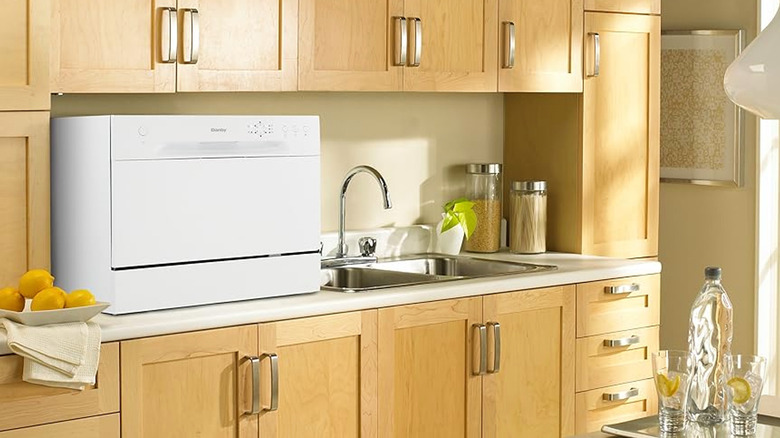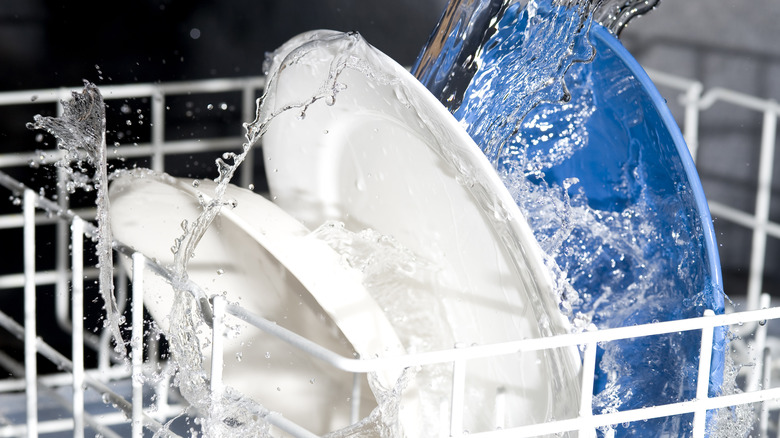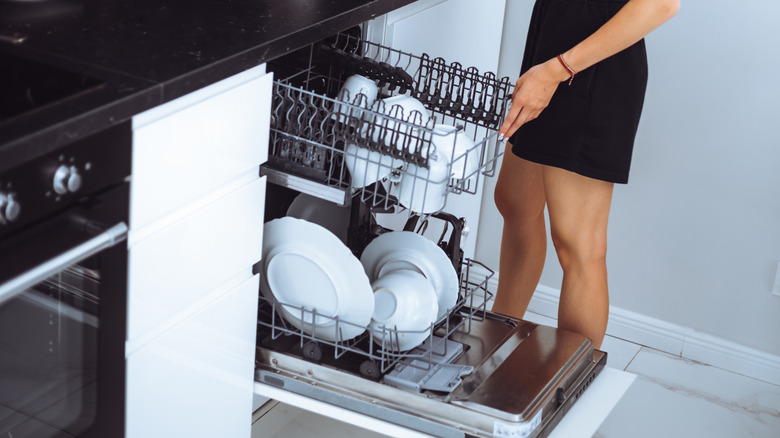The Disadvantages Of Countertop Dishwashers You Probably Haven't Considered
We may receive a commission on purchases made from links.
A countertop dishwasher may be ideal for your home if your household has limited space or a kitchen that does not come equipped with hookups. Hand-washing dishes, after all, is a chore that most of us would rather skip. As the name implies, these compact appliances fit conveniently on a counter and only require a small amount of space to provide some of the time-saving benefits provided by a full-size dishwasher. Despite their practicality in certain situations, countertop dishwashers come with a few significant disadvantages that you might not have considered. Their downsides include limited capacity and a lack of advanced features, and they also might not save as much water as you expect.
To choose the best countertop dishwasher for your needs, you want to weigh the pros and cons. Aside from their size and convenience factor, compact dishwashers have no significant advantages over traditional ones, and their limitations may outweigh their benefits. It's important to carefully consider each of these factors so you don't end up with a bulky appliance that's just stealing precious counter space.
How countertop dishwashers fall short
Countertop dishwashers are made for easy cleaning, but perhaps their biggest disadvantage is their limited capacity. It can cause constant frustration for households that generate a significant amount of dirty dishware, requiring multiple loads per day. The compact size of these appliances also makes it challenging or impossible to fit larger items, like pots, pans, or serving dishes. So after cooking, you might still have to wash a lot of dishes by hand. Plus, these appliances tend to fall short when it comes to extra functionality since many lack advanced cleaning features, like heavy-duty cycles for heavily soiled dishes or gentle settings for delicate glassware.
Somewhat counterintuitively, the use of compact dishwashers might not necessarily lead to less water and energy use. Since they have smaller spray arms and comparatively weak water pressure, they may not clean your toughest dishes effectively. This could call for pre-rinsing dishes or hand-washing those that weren't adequately cleaned, requiring extra water usage. Its limited capacity would also require you to do more loads, thus using more water, especially if you have a bigger family with more dishes to clean than usual. It can be even more inefficient if the appliance lack an energy-saving mode or eco-friendly cycle. Depending on the number of loads you need to run every day, the dishwasher may not be an asset to your energy bill, either.
How to get around the limitations of countertop dishwashers
If your kitchen has dishwasher hookups but can't handle a full-size appliance, then a slimline dishwasher might be the answer. These narrower models can fit into small spaces, like studio apartments, but provide better capacity and cleaning power than countertop units. With these alternatives, you don't have to clutter on top of your kitchen island, deal with running multiple loads, or still have to hand-wash large dishes.
If a slimmer built-in dishwasher is still not a viable option for your home, then the good news is that there are high-end countertop dishwasher models available that offer premium features and help you avoid the major disadvantages. The Danby Countertop Dishwasher boasts a high-performance spray arm, eight different wash cycles, a large capacity, and low-water consumption. The Magic Chef Energy Star 6 Plate Countertop Dishwasher is a similar product that conserves energy use and is easy to install. Plus, the Black and Decker 6 Place Setting Countertop Dishwasher also has the same great features and is slightly smaller and lighter than the other two units. Whichever option you choose, just steer clear of the worst countertop dishwasher brands.


